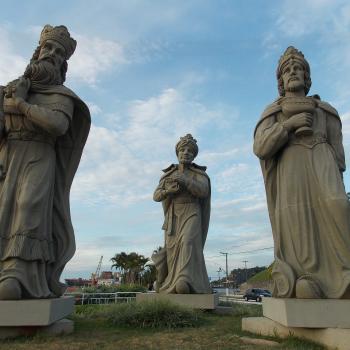
If we accept N.T. Wright’s description of the gospel in Simply Good News—as good news about something that has happened and something that’s going to happen which changes the in-between time we’re living in—then we have to accept a break in the continuum of ways things have always been done. Something has interrupted the “natural” course of events in such a dramatic manner that the systems—functional or dysfunctional—that we have relied on no longer reign supreme.
Paul’s description of this radical break in Galatians—“There is neither Jew nor Gentile, neither slave nor free, nor is there male and female, for you are all one in Christ Jesus”—is not addressing proper order in the church or the issues of ministry and calling, but it does give us a powerful principle of correspondence. There is no preference of background, gender, race, or economic class that makes any difference in our relationship with God.
Yet all those differences enter into our negotiations with one another.
When I was a child, I really wanted to grow up to be a pastor like my dad. But girls don’t become pastors. So I aimed instead at being a missionary, which was a laudable goal for Evangelical girls and safely feminist at a distance. “Feminist” is such a slippery term that I can’t even tell you if I am one or not. But I do believe that Paul’s shocking statement in Galatians is so radically, triumphantly, and perpetually challenging the church that we have not begun to plummet its meaning.
I do believe men and women are called to become apostles, teachers, and preachers; healers and givers and servers; pastors and prophets and evangelists. But, the Evangelical asks, are they called to be “senior pastors”?
The problem with the question is not the gender; it’s the institution and the polity. From the earliest days of the church, the institution has adopted and adapted the forms of governance that surrounded them. It wasn’t a conspiracy, just an organic model of organizing a growing and diverse body of people according to the models of human experience around them. Roman provinces were models for Christian dioceses. Governorships were models for bishoprics. One of the reasons Montanus found himself outside the boundaries of Christian orthodoxy was that he elevated the roles of Priscilla and Maximilla, and the church was already leery about the influence of women in Christian leadership.
The debate around women in Christian leadership today is really a debate about the structure of the church, not about the role of women. The job of senior pastor has been molded toward male membership—like a club—and trying to squeeze a woman into that mold naturally feels uncomfortable. It’s the mold that has to change, and for that to happen our Christian imaginations must mature.
We have churches with senior executives, boards, and committees, but these configurations—as serviceable as they have been—are scaffolding, not substance. For Paul’s vision to be truly realized, we’re going to have to expand our vision of what church looks like and how it operates. And of course, that is terrifying to many, both men and women. Many men like having power in the church, and many women want them to have it. And yet, of course, it is not about power or authority. It really isn’t about complementarianism versus egalitarianism. It’s about something earth-shattering that happened which has changed the course of human relationships under the banner of Christ and which, consequently, should disrupt our “normal” patterns of “best practices.”
I have yet to see anyone think creatively about the future structures of the Church.












